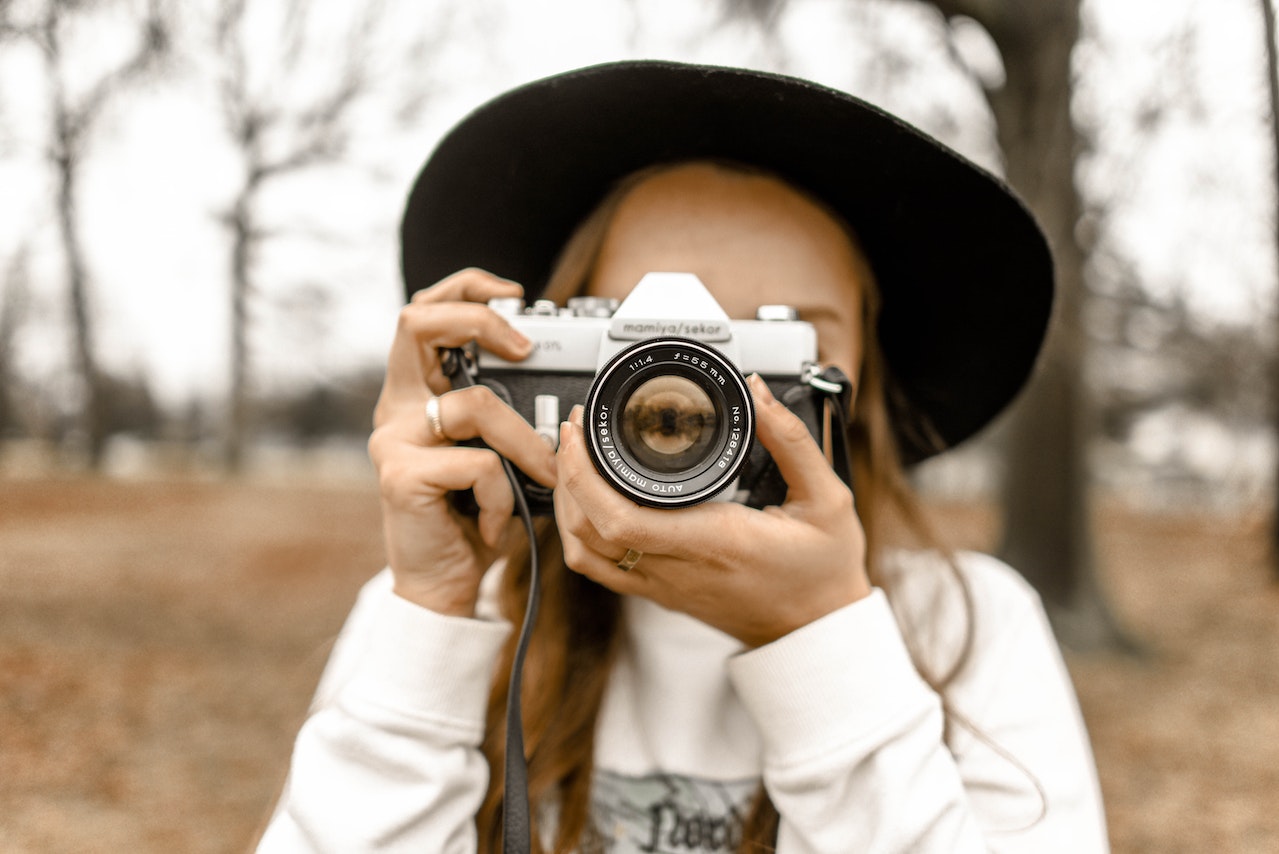
Have you ever daydreamed about turning your passion for photography into a thriving business? Wondering how to start a photography business with no experience?
Well, today is your lucky day!
In this detailed guide, we’ll explore everything you need to know about starting a successful photography business from scratch, even if you have no experience.
We’ll cover topics such as courses to get you started, building a portfolio quickly, how to price, and marketing strategies to help you create a blossoming photography career.
So, grab your camera and a glass of vino, and let’s dive in!
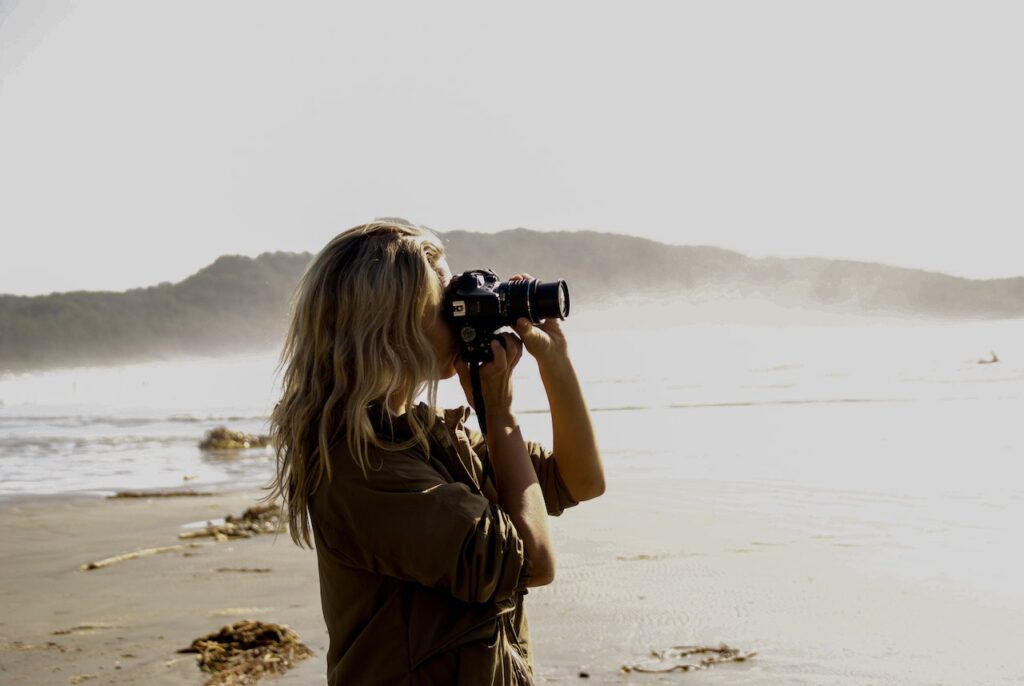
Understand your photography market and pick a niche
Before you jump into the world of photography, it’s important to understand the market you’re entering given the area you will be planning on serving.
Are you in the suburbs with a lot of young families around you that will want photos of family, baby, or milestones?
Maybe you’re in the heart of the city with lots of corporate events or products needing photography.
Maybe you live around local bloggers or influencers looking to outsource photography or photo editing.
Or do you live right next to a hospital, where you could partner with hospitals to provide newborn photography?
Some popular photography niches to toss around are:
- Wedding
- Family portrait
- Newborn
- Real Estate (residential and commercial)
- Lifestyle and blog style
- Food
- Product
Research current market trends, competitor strategies, and potential opportunities for someone just breaking into the market. By having a good grasp of the opportunities around you, you’ll be better prepared to carve out your own niche for your photography business.

Take a photography course
Learning how to start a photography business with no experience starts with learning some technical skills! Here are some of the most popular online courses that cater to beginners:
1. Photography Basics and Beyond: From Smartphone to DSLR (Coursera)
Join Michigan State University’s fantastic course that covers all the must-know photography concepts and techniques, whether you’re a smartphone snapper or a DSLR devotee.
2. Beginner Nikon Digital SLR (DSLR) Photography (Udemy)
Calling all Nikon DSLR lovers! This course is designed just for you, teaching the ins and outs of using Nikon DSLR cameras and essential photography concepts.
3. Beginner Canon Digital SLR (DSLR) Photography (Udemy)
Are you Team Canon? Then this class is your perfect match, focusing on the basics of Canon DSLR cameras and fundamental photography know-how.
4. Introduction to Photography: The Universal Language (Skillshare)
Learn from the amazing professional photographer and filmmaker Justin Bridges as he shares photography basics, such as exposure, composition, and post-processing, in a fun and engaging way.
5. Photography Masterclass: A Complete Guide to Photography (Udemy)
Want to build a rock-solid foundation in photography? Look no further than this comprehensive course that covers everything from camera settings to lighting and post-processing.
6. The Art of Seeing: Photography Training for the Artist in You (CreativeLive)
Let renowned National Geographic photographer Frans Lanting guide you in developing your artistic vision and enhancing your ability to see and capture breathtaking images.
7. Fundamentals of DSLR Photography (CreativeLive)
Join photographer John Greengo in this course that covers DSLR photography basics, including camera settings, lenses, and composition techniques.
And remember, the best course for you will depend on your learning style, budget, and camera of choice.
Courses act as your compass when learning how to start a photography business with no experience.
While these courses offer fantastic learning opportunities for starting your own photography business at your own pace, don’t forget to explore in-person workshops, local community college classes, and photography clubs for more hands-on experiences.
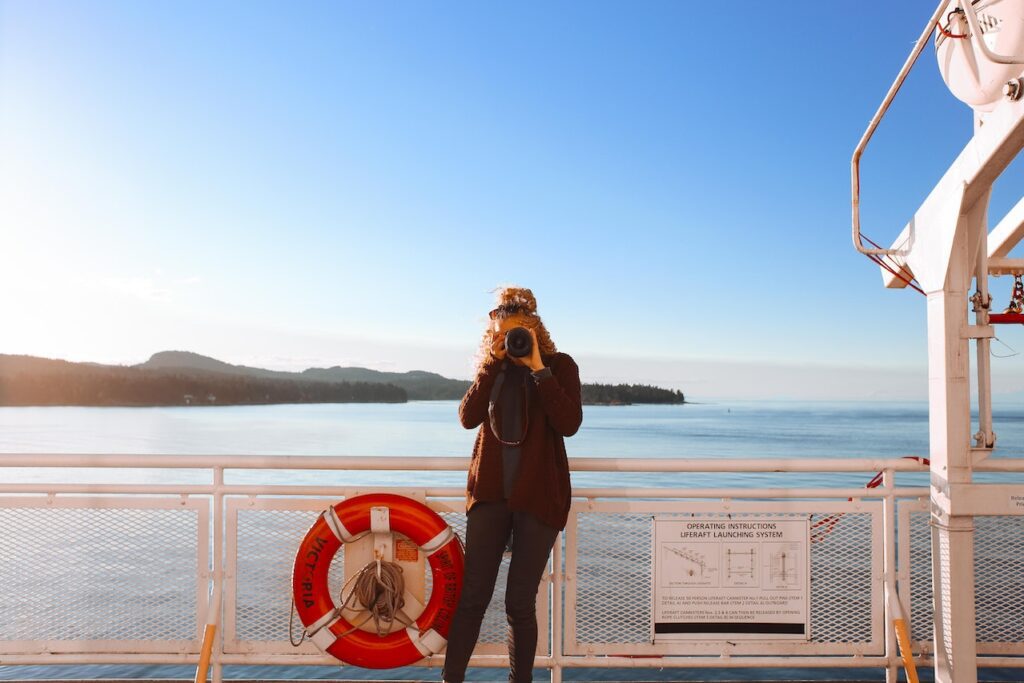
Invest in Essential Equipment
Starting a successful photography business requires an initial investment in photography equipment. You’ll need a camera body, lenses, lighting equipment, photo editing software, and a reliable computer.
Here is a list of popular camera body types, lenses, lighting, and photo software used in some common photography niches:
Wedding Photography
Shooting wedding photography requires a certain combination of equipment. Here is what is typically used:
- Camera bodies:
- Canon EOS R6
- Nikon Z6 II
- Sony A7 III
- Lenses:
- Canon EF 24-70mm f/2.8L II USM
- Nikon AF-S NIKKOR 70-200mm f/2.8E FL ED VR
- Sony FE 85mm f/1.8
- Lighting:
- Godox V1
- Profoto A1X
- MagMod flash modifiers
- Westcott Apollo Orb softbox
- Editing software
- Adobe Lightroom
- Adobe Photoshop
- Capture One
Portrait Photography
- Camera bodies:
- Canon EOS R5
- Nikon Z7 II
- Sony A7R IV
- Lenses:
- Canon EF 85mm f/1.4L IS USM
- Nikon AF-S NIKKOR 105mm f/1.4E ED
- Sony FE 135mm f/1.8 GM
- Lighting:
- Profoto B10
- Elinchrom ELB 500 TTL
- Westcott Rapid Box softbox
- Profoto 5′ Octa Softbox
- Editing software
- Adobe Lightroom
- Adobe Photoshop
- Capture One
Lifestyle Photography
- Camera bodies:
- Fujifilm X-T4
- Sony A7C
- Canon EOS RP
- Lenses:
- Fujifilm XF 35mm f/1.4 R
- Sony FE 28-70mm f/3.5-5.6 OSS
- Canon RF 50mm f/1.8 STM
- Lighting:
- Godox AD200
- Profoto A1X
- Westcott 7′ Parabolic Umbrella
- Editing software:
- Adobe Lightroom
- Adobe Photoshop
- Capture One
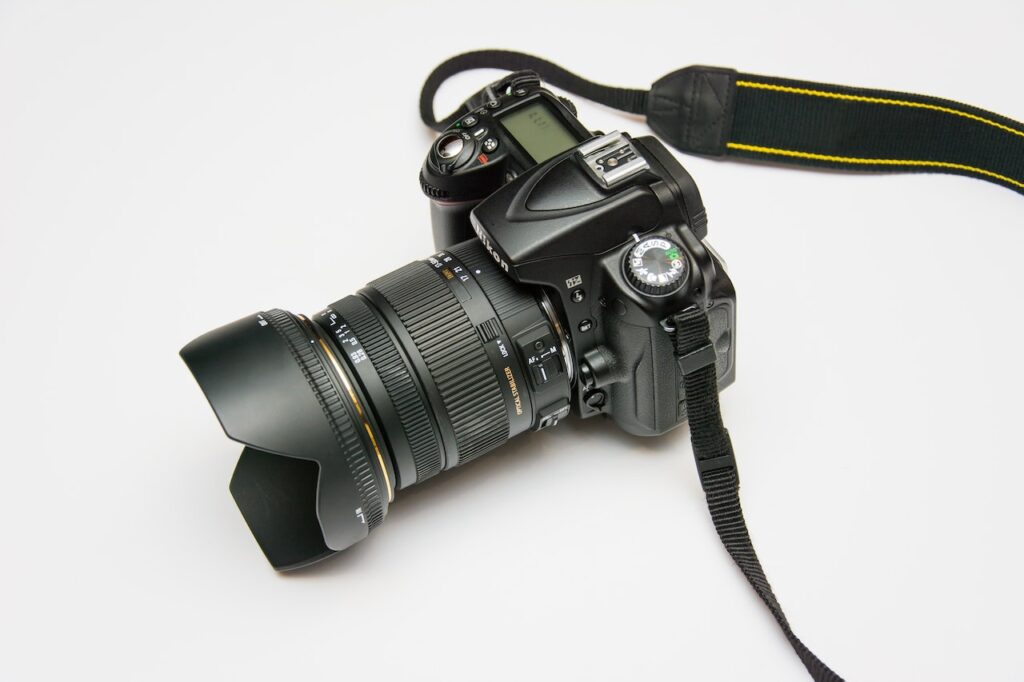
Food Photography
- Camera bodies:
- Nikon D850
- Canon EOS 5D Mark IV
- Fujifilm GFX 50S
- Lenses:
- Nikon AF-S Micro NIKKOR 60mm f/2.8G ED
- Canon EF 100mm f/2.8L Macro IS USM
- Fujifilm GF 120mm f/4 R LM OIS WR Macro
- Lighting:
- Aputure AL-M9
- Godox SL-60W
- Neewer Softbox Kit
- Editing software:
- Adobe Lightroom
- Adobe Photoshop
- Capture One
Product Photography
- Camera bodies:
- Canon EOS R5
- Nikon Z7 II
- Sony A7R IV
- Lenses:
- Canon RF 100mm f/2.8L Macro IS USM
- Nikon Z MC 105mm f/2.8 VR S
- Sony FE 90mm f/2.8 Macro G OSS
- Lighting:
- Godox SL-150W, Neewer 660 LED Video Light Kit
- Lastolite Ezybox II softbox
- Editing software:
- Adobe Lightroom
- Adobe Photoshop
- Capture One
Do thorough research on what equipment suits your photography niche best and invest in quality gear that will grow with your business.
Create an Organized Workspace
Having a dedicated studio space for your photography business will help you stay organized and efficient. Keep your photography equipment neatly stored and easily accessible.
Helpful products include a camera gear organizer like the Peak Design Tech Pouch or Cinebags CB27 Lens Smuggler, and a reliable external hard drive for backups, such as the Western Digital My Passport or Seagate Backup Plus.
It’s also important to keep a separate place for all your marketing materials, so invest in some quality desk organizers.

Build a Portfolio
A strong portfolio is crucial for attracting clients for your photography business in a particular niche.
To build yours quickly, consider offering free or discounted sessions to friends and family, collaborating with other creatives, participating in photography meetups, and working on personal projects that showcase what you can do.
Start with about 10 strong images minimum before going to market.
Building a strong visual portfolio will act as your backbone as you learn how to start a photography business with no experience, and move towards pricing and marketing your services.
Price Your Services
Pricing your services is a delicate balance. Consider factors such as time spent on each project, equipment and overhead costs, your level of expertise, and market rates for similar services in your area.
Start with lower rates to attract clients but don’t be afraid to raise them as you gain experience and build a solid portfolio.
Here are some ballpark figures to help give you a better idea of what to expect in various photography niches:
Wedding Photography Pricing
Wedding photographers typically offer packages that can range anywhere from $1,000 to $10,000+.
Most charge between $2,000 to $4,000 for a full day of coverage, including edited photos and potentially a second shooter or additional services like engagement sessions or albums.
Portrait Photography Pricing
Portrait photographers often have session fees ranging from $100 to $500+, depending on the length and complexity of the shoot.
Additionally, they may offer packages or á la carte options for prints, digital files, or other products, which could add several hundred to a few thousand dollars to the total cost.
Lifestyle Photography Pricing
Lifestyle photographers might charge between $200 and $800 for a session, including a specific number of edited images.
The price may vary depending on the location, session duration, and whether it’s an individual or family shoot.
Food Photography Pricing
Food photographers often charge by the hour, day, or project, with rates ranging from $50 to $500 per hour, or $300 to $5,000+ per day.
Factors like image licensing and usage rights may also impact the final cost.
Product Photography Pricing
Product photographers usually charge per image, per hour, or per project, with prices ranging from $25 to $500 per image, $50 to $250 per hour, or a flat project rate of a few hundred to several thousand dollars.
The cost can depend on factors like product complexity, image usage rights, and the volume of products to be photographed.
Event Photography Pricing
Event photographers might charge an hourly rate between $75 and $300 or a day rate of $500 to $2,000+, depending on the event’s size, duration, and complexity.
Some professional photographers also offer packages that include a specific number of edited images.
Real Estate Photography Pricing
Pricing in real estate photography often depends on the property size, location, and the level of service you provide.
Photographers might charge anywhere between $100 to $500+ for a standard shoot, which typically includes 10 to 25 edited photos.
For larger or luxury properties, the cost can go up to $1,000 or more, especially if you’re offering additional services like aerial photography, virtual tours, or video.
Establish Your Brand and Online Presence
Creating a recognizable brand for your own photography business will set you apart from competitors. Choose a unique business name (check Trademark registry before settling on a business name!), design a memorable logo on Canva or with a graphic designer, and create a professional website showcasing your portfolio.
Squarespace is a great option for website novices and has some beautiful drag and drop photography portfolio themes.
Additionally, leverage social media platforms like Instagram, Facebook, and Pinterest to engage with prospective clients.
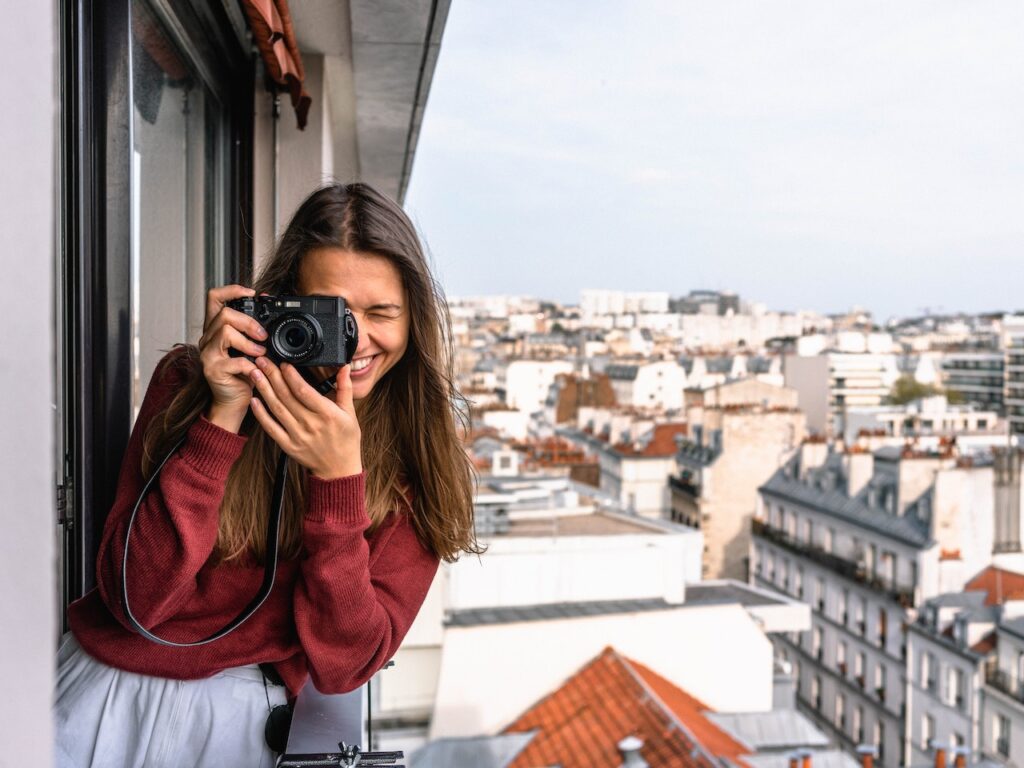
Go to Market
Here are some marketing strategy tips to quickly attract clients and get your photography business buzzing:
1. Leverage Social Media:
Leverage your social media pages and use platforms like TikTok, Lemon8,, Instagram, Facebook, and Pinterest to showcase your gorgeous work, connect with potential clients, and engage with your local community. Don’t forget to use location-specific hashtags and geo-tag your posts to increase visibility!
2. Collaborate with Local Businesses:
Team up with other creative professionals or local businesses, such as florists, event planners, or makeup artists, for joint projects and referrals. Together, you’ll create a powerhouse of creative magic and reach more clients.
3. Attend Local Events:
Get involved in community events, such as art shows, farmers’ markets, or charity fundraisers, and offer your photography services. This is a fantastic way to network, showcase your work, and get your name out there.
4. Offer Special Promotions:
Entice potential clients with limited-time offers, discounts, or mini-sessions. This can be a great way to fill up your calendar, especially during slower seasons.
5. Partner with Local Charities or Nonprofits:
Offer your photography services to local charities or nonprofit organizations for their events or campaigns. Not only will you be giving back to your community, but it can also lead to new connections and clients.
6. Create a Google My Business Listing:
Make it easy for local clients to find you by creating a Google My Business listing. This will help boost your online presence and visibility in local search results and on Google Maps.
It’s easy, free, and an essential step in boosting your online presence. Follow these simple steps to create your Google My Business listing:
- Go to the Google My Business website: Visit https://www.google.com/business/ and sign in with your Google account. If you don’t have a Google account, you’ll need to create one.
- Click “Manage Now”: After signing in, click the “Manage Now” button to start the process of creating your listing.
- Enter your business name: Type in the name of your photography business. If your business name is already in use or similar to another business, Google will show a list of suggestions. You can choose one of those or create a new business with the entered name.
- Choose a category: Select a category that best represents your photography business, such as “Photographer” or “Wedding Photographer.” This helps Google understand what services you offer and display your business to relevant search queries.
- Add your business location: Enter your business address if you have a physical location or studio. If you operate from home or serve clients at their chosen locations, you can select the “I deliver goods and services to my customers” option, which allows you to specify a service area.
- Provide contact information: Add your business phone number and website URL. This information will be visible to potential clients on your Google My Business listing.
- Verify your business: To ensure the accuracy of your listing, Google requires you to verify your business. You can choose from various verification methods, such as receiving a postcard with a verification code at your business address, phone call, or email (availability of these methods varies by location and business type). Follow the instructions provided by Google for the chosen verification method.
- Complete your listing: After verifying your business, you can now add more details to your listing, such as your hours of operation, a business description, and photos of your work or studio. The more information you provide, the more attractive your listing will be to potential clients.
- Manage and optimize your listing: Keep your listing up to date by regularly updating your information, adding new photos, and responding to reviews. Engage with your audience and use insights provided by Google My Business to understand your listing’s performance.
By completing these steps, you’ll have a Google My Business listing that helps potential clients discover your photography services and connect with you easily.
7. Network with Other Photographers:
Connect with fellow photographers in your area, join photography clubs, or attend workshops. Building relationships with other professionals can lead to collaborations, referrals, and valuable insights into the local market.
8. Encourage Word-of-Mouth Marketing:
Happy clients are the best advertisers, and every successful business knows it! Encourage them to leave reviews, share your work on social media, or recommend you to their friends and family. Positive word-of-mouth can work wonders for attracting new clients.
9. Offer a Referral Program:
Incentivize your existing clients to refer new clients by offering discounts, free prints, or other perks for each successful referral.

10. Optimize Your Website:
Make sure your website is up-to-date, user-friendly, and optimized for local search with relevant keywords, location-specific content, and a stunning portfolio to showcase your work.
Search Engine Optimization (SEO) is key to being found on the internet, and blogging about your niche industry is a great way to showcase your events and also be found by potential customers.
Hone Your Client Experience and Customer Service
Your clients’ experience goes beyond the photos you deliver. Focus on providing exceptional customer service from the first inquiry to the delivery of the final product.
Respond promptly to inquiries, maintain open communication, and add personal touches like handwritten thank you notes or small gifts.
Create a business plan
Creating a photography business plan is essential to making sure your photography business is on track to succeed.
Follow these simple steps to make a business plan that will help you achieve your goals and set your photography business up for success.
- Start with a vision: Begin by defining your vision for your photography business. What kind of photography do you want to focus on? Who is your ideal client? Paint a clear picture of where you’d like your business to be in the future.
- Set realistic goals: Write down a few short-term and long-term goals for your business. These might include the number of clients you want to work with each month, expanding your services, or growing your online presence.
- Determine your target market: Identify your ideal clients and the niche you want to specialize in. This could be wedding photography, family portraits, or commercial photography. Knowing your target market will help you tailor your strategy.
- Develop your brand identity: Your brand is the personality of your business. Think about the colors, fonts, and overall style that you want to represent your photography business. This will help you create a cohesive look across your website, marketing materials, and social media channels.
- Outline your pricing and packages: Research other photographers in your niche and consider their pricing structures. Create a list of packages that you’ll offer, along with the pricing for each. Be sure to factor in your time, skills, and expenses.
- Create a marketing strategy: Plan how you’ll reach your target audience and promote your services. This might include social media, networking events, and collaborations with other businesses. Don’t forget to include a budget for your marketing efforts.
- Budget and finances: Estimate your startup costs, ongoing expenses, and expected revenue. This will help you keep track of your finances and set realistic expectations for your business growth.
- Legal and administrative details: Research the necessary permits, licenses, and insurance you’ll need to operate your photography business legally. Don’t forget to register your business name and set up a separate bank account for your business finances.
- Set up your workflow: Plan your client process from start to finish, including booking, communication, photo sessions, editing, and delivering final images. A smooth workflow will help you provide an exceptional experience for your clients.
- Evaluate and adjust: Regularly review your business plan to track your progress and make adjustments as needed. Stay flexible and adapt to changes in the market, your niche, or your personal goals.
With these steps in mind, you’ll have a clear roadmap for your photography business, setting you up for success and helping you turn your passion into a thriving photography career.
Establish Contracts and Business Policies
Protect yourself and your clients by having clear contracts and policies in place.
Work with a lawyer to draft a contract that outlines the scope of work, payment terms, cancellation policies, and copyright information. You can do this virtually on Mark Cuban’s ZenBusiness (grab a $0 LLC set up while you’re at it!).
Learn more about if an LLC is right for your business. LLCs can help you protect all your personal assets should a business arrangement go south.
Additionally, make sure you have the right business licenses in place to operate your business in your state, and be aware of local sales tax rules (something that photography business owners forget to include in the final price).

Manage the Finances
Proper financial management is essential for a successful photography business. You can learn everything you need to know about how to start a photography business with no experience, but without a good financial handling, your business will fail to meet its potential.
A surefire way to make sure you’re staying afoot financially is by tracking your expenses. Track your income and expenses with accounting software like Quickbooks Self Employed.
Additionally, set a budget, and open a separate business bank account. Consider working with an accountant to help you manage taxes and make informed financial decisions.
Continuously Grow and Adapt
The photography industry is always evolving, so it’s crucial to stay up-to-date with the latest trends and techniques.
Attend workshops, subscribe to industry blogs and magazines, and connect with other photographers to continually improve your craft.
Embrace change and adapt your skills and strategies to stay ahead in the professional photography business.
Conclusion
Venturing into the professional photography business without any prior experience can be quite the thrilling rollercoaster ride.
Learning how to start a photography business with no experience can be daunting. But don’t worry! With this guide by your side, you’ll be on the right track to craft a successful business that mirrors your passion and unique vision.
Just remember that success takes time, so be patient, persistent, and never stop evolving your skills.
As you journey forward, you’ll gradually carve out your very own special place in the vast realm of photography. You have all you need to become a successful photographer and business owner – now it’s time to make your move!
So, here’s to wishing you the best of luck, and most importantly, never forget to enjoy every moment of this exciting adventure!




Leave a Reply